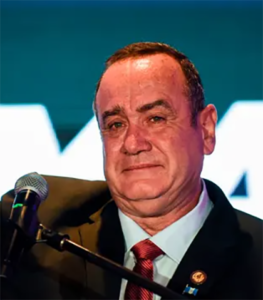Analysis – Guatemala’s thorny dilemma
Guatemala’s new hard-line conservative President Alejandro Giammattei faces a thorny dilemma in his dealings with the US as he takes up the reins of office.
 His predecessor, former television comic Jimmy Morales signed an unpopular migration deal under duress with the Trump administration that will see the troubled Central American country become effectively a buffer zone to stem migration to the US.
His predecessor, former television comic Jimmy Morales signed an unpopular migration deal under duress with the Trump administration that will see the troubled Central American country become effectively a buffer zone to stem migration to the US.
Yielding to the threat of a raft of economic sanctions from President Trump, Mr Morales agreed to make his country a so-called safe third country for migrants, despite its high levels of poverty and violence.
Most Guatemalans opposed the move. Guatemala is mired in poverty and many wonder how it is going to take in migrants if it can’t feed its own people.
President Giammattei, 63, is a conservative law-and-order hardliner who has promised to reinstate the death penalty and deploy soldiers on to the streets.
A former prisons chief, backed by the country’s economic and military power brokers, President Giammattei trounced his opponent Sandra Torres, a former first lady, to win the presidential race on his fourth attempt by securing 58 per cent of the vote.
Apart from dealing with the US, he now has to face questions about a low turnout and his legitimacy after about 60 per cent of eligible voters abstained after both candidates failed to inspire hope in the Central American country, where tens of thousands of people flee extreme poverty, famine, violence and corruption every month.
President Giammattei takes office in January but by then Guatemala may be embroiled in the deal reached with the Trump administration.
A trained surgeon and veteran public sector bureaucrat who had failed in three previous bids to secure the presidency, President Giammattei has called the deal “bad news,” saying Guatemala is not ready to cope with a potential jump in asylum-seekers.
A newspaper poll published this week in Guatemalan shows 80 per cent of respondents rejected the idea of the country accepting foreign migrants seeking asylum.
It is a moot point how much President Giammattei will be able to do to change the deal, which would require Hondurans and Salvadorans to apply for asylum in Guatemala rather than the United States and also foresees granting US visas to some Guatemalan workers.
The deal with the Trump administration risks a popular backlash, but not honouring it could see Guatemala subject to US taxes on remittances or tariffs on its export goods.
Also, President Giammattei will lead a nation struggling with a 60 poverty rate poverty rate as well as widespread crime and unemployment, which have led hundreds of thousands of people to migrate north.
Many Guatemalans have lost confidence in country’s political class after investigations by the International Commission against Impunity in Guatemala (CICIG), an UN-backed anti-corruption body, led to the arrest of then-President Otto Perez in 2015 and then threatened to topple his successor Mr Morales.
Morales narrowly escaped impeachment, and the CICIG also went after Ms Torres for suspected campaign finance irregularities. As a candidate, she was immune from prosecution.
President Giammattei has pledged to run an honest government.
“We’ll battle corruption from the very first day,” he said as he voted.












